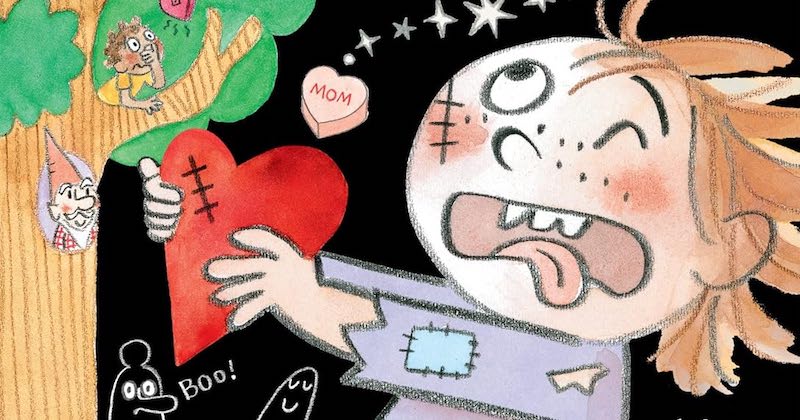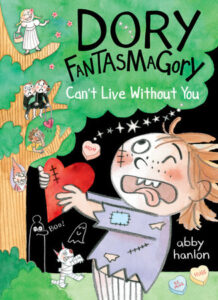
Dory Fantasmagory author Abby Hanlon has the real Tubtown toy.
The child who got us onto the Dory Fantasmagory books was fiercely cool and advanced at age 5: she dressed as Beetlejuice for Halloween, wore eyeliner, and once told my kid that she caught her mom putting money under her pillow after she lost a tooth. “So weird!” I still say when my kid brings it up. I now foist the Dory books—there are six in the series from author Abby Hanlon—onto younger and younger child-friends, keen to be The One who opens the door to the first wildly funny kidlit they’ll encounter. “She might not be ready for this,” I warned a friend whose 3-year-old was rapidly subsumed by the series. The 3-year-old got the comedy. She cackled laughing.
Abby Hanlon’s latest, Dory Fantasmagory: Can’t Live Without You, is “about” Dory’s mom going back to work, but the story is driven by Dory’s bizarre interludes with the crew of imaginary friends (and enemies) she keeps: Mr Nuggy, her fairygodfather; Mary, her oversized monster friend; and Mrs. Gobble Gracker, who takes a particularly alarming turn in this story. The book is full, as usual, with perfect grabs of dialogue from Dory, the baby of the family, and a degree of strangeness that can only have come from actual children: Abby Hanlon confirms that live children are a rich source of material for the books in this emailed chat. “My daughter told me once that when I die, she wants to ‘stuff me’ so that she can put me in a chair and always look at me,” wrote Hanlon. The story reflects big themes—fear of death, the detachment that comes with growing up—but they’re not what the story is about, if you take it at the face level of a child.
Some of the questions were submitted by my 8-year-old, Scout–I’ll let readers guess which. Enjoy!
Literary Hub: Did you have Tubtown growing up?
Abby Hanlon: Yes, I did. (And my husband had it too!) I stayed in the bath playing with it until the water was cold and my skin was shriveled up. In the fifth Dory book, Tiny Tough, Dory’s preoccupation with this unobtainable bath toy drives one of the story’s plotlines. When I was writing that book, I was pining over photos from an eBay listing for $750.
After the book came out, I got an email from a man named Peter Pook in Ontario who told me he was a grandfather, a painter, a retired toy designer … and the creator of Tubtown! He told me he had exactly one Tubtown left in his attic and that he wanted to mail it to me. So now I am, once again, an exultant owner of “the greatest toy in the universe.”
Peter told me the idea for Tubtown came from observing his own children. He wanted to create a “unisex playset” for the bath that inspired the same kind of prolonged play his daughters had with their dollhouse. It turns out my husband and I were part of a very small club; Tubtown was only sold for two years (1982 and 1983) before the company was acquired by another company who decided to discontinue it.
Peter and I became pen pals and even talked on the phone. He told me, “We are two peas in a pod looking for ways to kindle and encourage kids’ imaginations.” Now that I’m writing this, I’m thinking it might have made a good segment on This American Life.
What do you think the hardest thing about being a kid is?
Getting hit in the face with doorknobs.
Your newest gives us a good dose of Dory worrying about death, which children’s books don’t often do, or not in a childlike way. How you ~locate~ her kid ennui?
I wrote down a lot of what my twins said when they were little. Whenever I start on a Dory book, I look through my notes for funny lines. I had always skipped over all the macabre stuff because I thought that I couldn’t put it in an early chapter book. Until the sixth Dory when I realized I could. Dory is the age when kids often talk about death. If death is something kids think about, then it’s something that they want to read about. I just had to capture that fresh eyed perspective on death in a way that would be funny and relatable for kids, and not freak them (or their parents) out.
Some of my kids’ disturbingly magnificent lines just needed a little alteration. My daughter told me once that when I die, she wants to “stuff me” so that she can put me in a chair and always look at me. Instead of Dory wanting to taxidermize her mom, Dory says that after her mom dies, she wants to make a stuffed animal that looks just like her mom… “so I can always look at you.” I like the original line better, but sometimes I actually know when to compromise and not put it on my editor.
The mom in Dory gets a small but heroic role for parents reading the book. Are you ever aware of their eyes, or you do fashion Dory’s mother only in terms that make sense for kids?
Primarily, I’m thinking about the kids, but I also know that Dory’s parent’s reaction to her behavior is something kids and parents are very sensitive to. If her parents are too permissive, Dory seems like a brat. And if their rules and consequences are too effective, it doesn’t feel realistic. My goal is to make Dory identifiable to kids, but I haven’t put a ton of thought into making the parents relatable. Yet so many parents identify with Dory’s mom so I wonder if that’s because kids are universally annoying in the same way…? My local bookstore told me that a few parents whose kids have aged out of Dory have come in to buy the new book to read themselves. I appreciate this small unintended audience.
How many imaginary friends did you have as a kid? Were you like Dory growing up?
I don’t know if I had imaginary friends, but I had a lot of games that involved me talking to someone that nobody else could see. Just like Dory. But my son’s imaginary friends were the kind that stuck around. He had imaginary grandmothers named Soman and Doman who lived under the BQE (Brooklyn Queens Expressway). Whenever we asked him, “How do you know that?” he would say, “Soman and Doman told me.”
Dory cracked the code for you after a couple of other manuscripts that agents/publishers didn’t go for. What changed for you and/or what are the limitations for first time children’s authors?
I think to be a successful children’s book author you have to fall into at least one of these categories: still be a kid at heart, have an incredible memory of your own childhood, or have spent a lot of time with children. I fall mostly into the last category. And I think I just hadn’t spent enough time around children. Or enough time reading children’s books—especially out loud to them. So, my first attempt to write picture books, the characters were too broad, the stories were flat, and my concept of my audience was nebulous. Probably all common mistakes of first-time authors. I also think it’s a good idea to read your work out loud to kids. You need a test audience.
How do you get past your own adult-ness when creating work for kids?
It’s very hard. I wish there was some way that I could think like a kid, but I can’t. Although maybe just acknowledging that is an important part of my process. Sometimes my ideas ring false to me because they came from my adult brain. So, I work hard to infuse the books with kids’ ideas and dialogue. Here’s an example: imagine you, as an adult author, were trying to come up with a reason a kid had a crush on someone in their kindergarten class. You could rack your brain and come up with all kinds of zany reasons, but could you ever come up this: “I love him because his head is round, and I like circles.” (Told to me by a parent.)
Were you precocious or more of a Happy Farms reader as a kid?
I think I was somewhere in between. I liked books but I was hyper and mostly wanted to play. I played with books! My sister and I played library. She was the librarian, and she made library cards (now retro) for our books and stuck them inside, and then she let me check them out. (Not sure if I read them before I returned them.)
Do you have any bossy siblings like Violet?
Yes, my sister is four years older than me, and we have a brother right in between, exactly like Dory’s family. My sister was bossy but I had such fierce temper tantrums that I was hard to control. Now as adults, I’m the bossy one.

Abby Hanlon, Dory Fantasmagory: Can’t Live Without You
Janet Manley
Janet Manley is a contributing editor at Literary Hub, and a very serious mind indeed. Get her newsletter here.



















